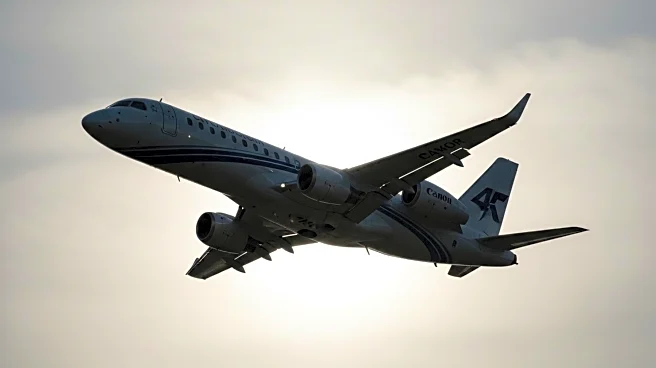What's Happening?
Air Niugini has commenced operations with its first Airbus A220-300, marking the beginning of a significant fleet renewal initiative. The airline plans to acquire eight A220-100s from Airbus and lease three A220-300s from Azorra. This move is part of a broader strategy to replace its aging Fokker aircraft and leased Boeing 737-800s, aiming to improve operational efficiency and reduce emissions. The inaugural flight took place on October 4, departing from Jacksons Airport in Port Moresby to Lae, a route that is historically significant for the airline. The A220s are expected to serve domestic routes during the day and shorter international routes at night, complementing the airline's existing Boeing 767-300s on routes such as Singapore.
Why It's Important?
The introduction of the Airbus A220 fleet is a strategic move for Air Niugini, enhancing its operational capabilities and environmental sustainability. The A220's fuel efficiency and ability to operate on shorter runways are particularly advantageous given Papua New Guinea's challenging terrain and weather conditions. This fleet renewal is supported by a K3 billion ($715 million) investment from the government, underscoring the importance of air connectivity in promoting national unity and economic development. The new aircraft will not only improve domestic travel but also expand international service options, potentially boosting tourism and business travel.
What's Next?
Air Niugini plans to complete the integration of its new A220 fleet by 2028, gradually phasing out older aircraft. The airline's strategy includes expanding its service offerings both domestically and internationally, leveraging the A220's capabilities. Stakeholders, including government officials, have expressed commitment to supporting this transition, which is expected to enhance the country's air travel infrastructure. As the fleet renewal progresses, Air Niugini may explore additional routes and partnerships to maximize the benefits of its modernized fleet.
Beyond the Headlines
The fleet renewal initiative by Air Niugini reflects broader trends in the aviation industry towards more sustainable and efficient operations. The adoption of newer aircraft models like the A220 is part of a global shift to reduce carbon footprints and improve service reliability. This move also highlights the role of government investment in supporting national carriers, which can have long-term benefits for economic growth and connectivity in regions with challenging geographical conditions.










